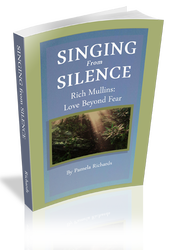Richard and I spoke about creativity and the process frequently. He broke down some of the facets of his songwriting process for me. He said he deliberately chose words for his lyrics that could carry the greatest possible number of applications to his audience. To a songwriter, the more ambiguous the lyrics are, the better. As a result, interpretations of songs are as numerous and varied as the birds of the air. The glory of song is that can touch everyone who hears it in a different way, while the music of the song binds all those who hear it in a common emotion.
Like all his songs, "Elijah" has many interpretations, and none of them are wrong. He wrote "Elijah" a few years before the last time we met in 1984. Richard consistently named this as his favorite of his own songs.
At the beginning of his Nashville career, Richard faced his fears of poverty, wealth, success, failure, death, and life. The result of his initiation as a public figure was his song, “Elijah.”
An artist faces his deepest fears at the initiation of his public career. He is fully aware that his work may not be well-received. An artist thrives on looking at life from a new perspective, often one that is not agreeable to his audience. His message may be rejected, or his execution may be criticized. It is natural for an artist to identify with his work, since it emerges from his personal experience. His fears of personal rejection are magnified at the moment when his work is exposed to the world.
An artist and a prophet have something in common. The prophet Ezekiel was told to eat the scroll God gave him. In his mouth, it would be sweet; but in his stomach, it would turn sour. To be more explicit: for the prophet, what goes down must come up. Like it or not, it is the work of the prophet or the artist to take the personal and private moments God reveals to him and make them visible and public.
Several events which coincided with Richard’s writing this song contribute to the imagery used in “Elijah.”
John Lennon had been assassinated in December of 1980. Richard found himself very moved by this event. There was a Candlelight memorial service in Central Park following Lennon's death that drew 400,000 fans. A reminder: life is short. Had Lennon not been a public figure, he would not have been targeted for assassination. Success is a risk. Life can be shorter for artists than it is for others.
Richard's great-grandmother, the woman who had first taught him to play piano, had recently passed away. She may have lived a quiet, private life, but her life was limited like everyone else’s. Fame, lack of fame--we will not live forever.
Hippocrates was speaking of the art of medicine when he said “Life is short, art is long.” Yet all artists share a hope that our work will live on beyond our lifespans.
When he wrote “Elijah,” Rich Mullins had just become known in Nashville as Amy Grant's up and coming new songwriter. He had not yet signed with a management company. The Nashville music machine and Rich Mullins were not a match made in heaven. Any money making corporation likes a sure thing better than a gamble, and any ethical artist prefers self-expression to commercialism. Richard's first success had come from a lively, upbeat praise song, "Sing Your Praise to the Lord." He was feeling pressured to go on producing money-making songs which closely resembled his first one. As successful as he continued to be with worship songs, Richard knew that he had a much greater range to offer.
Praise is the destination, but a Psalm frequently starts in a dark place and brings us on a journey before it lifts us into the light of praise. Richard knew his audience was on that very human journey, just as he was. He wanted nothing to do with any temptation to succeed that would limit the range of expression that would permit him to touch more lives.
He was also dealing with fear of failure: “If they fed me like a pauper, or if they dined me like a prince.”
Some have speculated that this song is a prophecy of his death on the highway. He did tell me on several occasions he had premonitions of an early death. And since I last saw Richard, I have reconsidered my ideas of how God speaks to us. But I still don't believe Richard intended this song to describe his own death.
Richard never used the word "death" or "die" in this song. Read the story of Elijah again. In fact, Elijah never died. To "go out like Elijah" is to live on deathlessly. Like any artist, Richard hoped his songs would live on after his lifespan. His creative ethics demanded that he leave behind the best songs he had to offer, not the biggest money-earners. Regardless of his popularity or lack of it, he knew what he had to do. Simply do his best to be true to his own experiences in his songs, whether they would be popular or not. Four hundred thousand candles are wonderful, but a farewell from the stars of the sky would do just as well for Richard.
"When I look back on the stars, it'll be like a candlelight in Central Park. And it won't break my heart to say goodbye. . ."


 RSS Feed
RSS Feed
